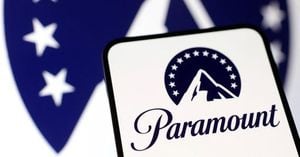On the morning of September 11, 2001, the world changed forever. In countless homes across New York City, the day began like any other, but quickly turned into one of the most harrowing in American history. For many, the attacks on the World Trade Center were a distant tragedy, but for others—like Haitian American families in Brooklyn and even British royalty visiting the city—the events struck painfully close to home. As the nation marked the anniversary in 2025, stories of resilience, identity, and gratitude resurfaced, reminding us all of the enduring impact of that fateful day.
In a Flatbush apartment in Brooklyn, the morning of September 11 started with the blare of a house phone and the frantic voice of a father, echoing through the halls in Kreyol: "Wake up, wake up, child. We’re in danger. Wake up!" According to the Haitian Times, these words jolted one Haitian American woman from her sleep, as memories of her time in and around the World Trade Center came flooding back. She remembered working as a JP Morgan Chase intern, riding the elevator up Tower 2 at 6 a.m. twice a week, and mingling with fellow interns over lunch in the shadow of the skyscrapers. She’d strolled past the gold vault at the Federal Reserve Bank, visited the offices of the Wall Street Journal, and shopped from vendors on the bustling sidewalks of lower Manhattan. On that Tuesday morning, she realized just how easily she could have found herself in the heart of the tragedy. "I could’ve been in that rubble had the hijackers picked any of the days I was there," she reflected, a sentiment echoed by many New Yorkers who recounted near-misses and narrow escapes.
Within the tight-knit Haitian community in her building—a three-story limestone filled with families from Haiti—stories of survival and luck were quickly traded. One neighbor, Junior, survived only because he left his World Trade Center office to grab a bite from a sidewalk cart just before the first plane struck. Another, her cousin Jimmy, was delayed by a late subway train; had he arrived just one minute earlier, he believed, "I wouldda been dead." Her brother, a college student at the time, was in a Metrotech building across the river when the towers were hit. He joined the streams of soot-covered New Yorkers trekking the four miles home to Flatbush, all trying to process the magnitude of what had just happened.
For the Haitian American community, the aftermath of 9/11 was marked by a mix of relief and reflection. "Our community didn’t experience the same depth of loss or, later on, persecution and prosecution that followed for those groups," the Haitian Times writer noted, referencing the heightened scrutiny faced by Muslim and Arab Americans in the wake of the attacks. There was no monument for Haitians who died on 9/11, and most felt spared the worst of the tragedy. Yet, the impact of stricter laws and the climate of suspicion that followed was felt by all minorities. The author described the rise in racial profiling as "an extension of the racial profiling and brutality Black people had to shoulder historically," and this realization spurred her to take action. "A few months later, I applied for citizenship—a step that spoke volumes about how I saw myself and where I belonged."
The decision to become a U.S. citizen was not just about legal protection; it was an affirmation of belonging. "First—New York City is home. America is home. Even though I wasn’t born on American soil, I realized on 9/11 that if America is under attack, that means I’d be pulverized too in an assault. No enemy is going to ask for my Haitian identification card to spare me." By the time she applied for citizenship, she had lived in the United States longer than she had in Haiti. The tragedy forced her to "let go, feeling like a Haitian just going through the motions while waiting for God knows what with Haiti," and to finally claim America as her own. The right to vote, long a cherished goal, became another driving force. "Considering how much time I spent at rallies, following politics and, yes, calling people at dawn to remind them to vote, I figured I might as well have the option to cast a ballot myself."
Over the years, as the new Freedom Tower rose above the Manhattan skyline, the author’s sense of American identity only deepened. She reported on the debates over the site, witnessed the anguish of families of Ground Zero workers, and visited the memorial with her own family. Each of these moments reinforced the choice 9/11 had inspired: to embrace the best parts of both her Haitian heritage and her American home. "Now, does this mean I stocked up on American flag lapel pins or that my acceptance is a rejection of being Haitian? Of course not. More than anything, it meant looking for and embracing the best parts of both countries I love so dearly to build my little world."
Meanwhile, across the Atlantic, another figure with deep ties to New York and the United States marked the anniversary with her own poignant reflection. Sarah Ferguson, the Duchess of York, took to Instagram on September 11, 2025, posting a photo of the memorial light display and sharing her memories of being in New York on that tragic day. "Today, we pause to remember the lives lost and forever changed on September 11th, 2001. I was in New York at the time, and like so many, I will never forget the shock, the heartbreak, and the extraordinary courage I witnessed that day," she wrote, as reported by Hello! Magazine.
Her tribute continued, honoring the resilience and unity that emerged in the aftermath: "Out of unimaginable tragedy came stories of kindness, unity, and resilience that continue to inspire us all. My thoughts and prayers are with the families who lost loved ones, the survivors, and the first responders whose bravery and selflessness remind us of the very best of humanity. We must never forget." Her words resonated with many, and one follower even recalled seeing her on Good Morning America promoting her book when the news of the attacks first broke.
Ferguson’s connection to the United States runs deep. After divorcing Prince Andrew in 1995, she lived in America for nearly a decade, raising her children and building a new life. At a charity event in Palm Beach in 2024, she delivered an emotional speech, saying, "I wanted to thank the American people for giving me back my life, always have a handkerchief, by the way, I get so emotional. When I came in 1995... I don’t know how to thank you. You gave my children a life. I was divorced, from England, I went to live in America, and I got a job. And it’s all thanks to you."
As the world paused to remember the events of 9/11 in 2025, these personal stories—of near-misses, new beginnings, and enduring gratitude—highlighted the tragedy’s far-reaching effects. Whether in a Brooklyn apartment or on the Instagram feed of a British duchess, the legacy of September 11 continues to shape identities, inspire acts of courage, and remind us all of the resilience that emerges in the face of adversity.




